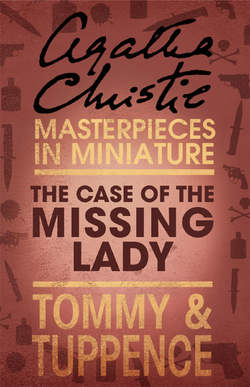Читать книгу The Case of the Missing Lady: An Agatha Christie Short Story - Агата Кристи, Agatha Christie, Agatha Christie - Страница 5
ОглавлениеThe Case of the Missing Lady
‘The Case of the Missing Lady’ was first published in The Sketch, 15 October 1924. Sherlock Holmes was created by
Sir Arthur Conan Doyle (1859–1930).
The buzzer on Mr Blunt’s desk – International Detective Agency, Manager, Theodore Blunt – uttered its warning call. Tommy and Tuppence both flew to their respective peepholes which commanded a view of the outer office. There it was Albert’s business to delay the prospective client with various artistic devices.
‘I will see, sir,’ he was saying. ‘But I’m afraid Mr Blunt is very busy just at present. He is engaged with Scotland Yard on the phone just now.’
‘I’ll wait,’ said the visitor. ‘I haven’t got a card with me, but my name is Gabriel Stavansson.’
The client was a magnificent specimen of manhood, standing over six foot high. His face was bronzed and weatherbeaten, and the extraordinary blue of his eyes made an almost startling contrast to the brown skin.
Tommy swiftly made up his mind. He put on his hat, picked up some gloves and opened the door. He paused on the threshold.
‘This gentleman is waiting to see you, Mr Blunt,’ said Albert.
A quick frown passed over Tommy’s face. He took out his watch.
‘I am due at the Duke’s at a quarter to eleven,’ he said. Then he looked keenly at the visitor. ‘I can give you a few minutes if you will come this way.’
The latter followed him obediently into the inner office, where Tuppence was sitting demurely with pad and pencil.
‘My confidential secretary, Miss Robinson,’ said Tommy. ‘Now, sir, perhaps you will state your business? Beyond the fact that it is urgent, that you came here in a taxi, and that you have lately been in the Arctic – or possibly the Antarctic, I know nothing.’
The visitor stared at him in amazement.
‘But this is marvellous,’ he cried. ‘I thought detectives only did such things in books! Your office boy did not even give you my name!’
Tommy sighed deprecatingly.
‘Tut, tut, all that was very easy,’ he said. ‘The rays of the midnight sun within the Arctic circle have a peculiar action upon the skin – the actinic rays have certain properties. I am writing a little monograph on the subject shortly. But all this is wide of the point. What is it that has brought you to me in such distress of mind?’
‘To begin with, Mr Blunt, my name is Gabriel Stavansson –’
‘Ah! of course,’ said Tommy. ‘The well-known explorer. You have recently returned from the region of the North Pole, I believe?’
‘I landed in England three days ago. A friend who was cruising in northern waters brought me back on his yacht. Otherwise I should not have got back for another fortnight. Now I must tell you, Mr Blunt, that before I started on this last expedition two years ago, I had the great good fortune to become engaged to Mrs Maurice Leigh Gordon –’
Tommy interrupted.
‘Mrs Leigh Gordon was, before her marriage –?’
‘The Honourable Hermione Crane, second daughter of Lord Lanchester,’ reeled off Tuppence glibly.
Tommy threw her a glance of admiration.
‘Her first husband was killed in the war,’ added Tuppence.
Gabriel Stavansson nodded.
‘That is quite correct. As I was saying, Hermione and I became engaged. I offered, of course, to give up this expedition, but she wouldn’t hear of such a thing – bless her! She’s the right kind of woman for an explorer’s wife. Well, my first thought on landing was to see Hermione. I sent a telegram from Southampton, and rushed up to town by the first train. I knew that she was living for the time being with an aunt of hers, Lady Susan Clonray, in Pont Street, and I went straight there. To my great disappointment, I found that Hermy was away visiting some friends in Northumberland. Lady Susan was quite nice about it, after getting over her first surprise at seeing me. As I told you, I wasn’t expected for another fortnight. She said Hermy would be returning in a few days’ time. Then I asked for her address, but the old woman hummed and hawed – said Hermy was staying at one or two different places and that she wasn’t quite sure what order she was taking them in. I may as well tell you, Mr Blunt, that Lady Susan and I have never got on very well. She’s one of those fat women with double chins. I loathe fat women – always have – fat women and fat dogs are an abomination unto the Lord – and unfortunately they so often go together! It’s an idiosyncrasy of mine, I know – but there it is – I never can get on with a fat woman.’
‘Fashion agrees with you, Mr Stavansson,’ said Tommy dryly. ‘And every one has their own pet aversion – that of the late Lord Roberts was cats.’
‘Mind you, I’m not saying that Lady Susan isn’t a perfectly charming woman – she may be, but I’ve never taken to her. I’ve always felt, deep down, that she disapproved of our engagement, and I feel sure that she would influence Hermy against me if that were possible. I’m telling you this for what it’s worth. Count it out as prejudice if you like. Well, to go on with my story, I’m the kind of obstinate brute who likes his own way. I didn’t leave Pont Street until I’d got out of her the names and addresses of the people Hermy was likely to be staying with. Then I took the mail train north.’
